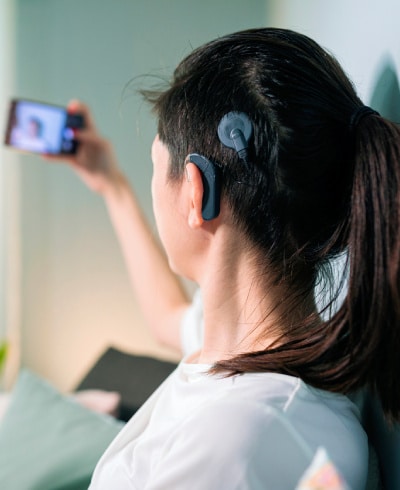
Navigate Any Listening Environment With Modern Hearing Aids
Modern hearing aids aren’t what you think they are. Manufacturers no longer focus on battery size, unit size or connectability; because they’ve already climbed that mountain. Instead, modern units are focused on adaptability, AI-assisted environmental learning, and active users like you.

Audiologists Show You the Best Solutions for You—Because One Size Doesn’t Fit All.
Every hearing loss is different because every patient is different. For example, someone who spends most of their time in the garden, reading, and watching television has different needs than someone who likes to go to parties, cycles and loves being front row at a concert. If both of those people have an identical hearing test, they may not benefit from the same hearing aid.

Providing Individualized Hearing Treatment Plans
1. Identifying Your Needs
Before we even perform a physical exam and hearing assessment, we want to learn about you. What’s your individual lifestyle? What activities do you do and where do you spend time doing them? What have you given up because you can’t hear?
Your Audiologist will work with you to develop a tailor-made treatment plan to best fit your individual needs. Your life is multi-faceted and so is your listening environment. We will recommend treatment options that meet your changing needs head-on.
2. Recommending the Latest Models
After we’ve analyzed your test results, we’ll discuss solutions if a hearing loss is detected. We work with multiple hearing aid manufacturers, and every model is a little different. What do they have in common? They all meet current FDA regulations for medical devices. They are very different from anything that would be purchased as a “hearable” or “listening device” without the support of a medical professional. Current hearing aid technology is now discreet, Bluetooth compatible, rechargeable, and has the intelligence of AI technology.
3. Professional Ongoing Support
Hearing aids are just the beginning of your unique, individualized and comprehensive treatment plan. Our audiologists work with you to make sure your hearing aids are comfortable, correctly adjusted and that you have the training to use and benefit from their specific technologies.

When Traditional Hearing Aids Aren’t an Option
Although hearing aids are the most common treatment option, they won’t work for all types of hearing loss. For some individuals, implantable hearing devices might be the key to improved communication. Implantable hearing devices are surgically implanted instruments designed to improve the transmission of sound. There are several types of implantable hearing devices; these include cochlear implants (CI) and bone anchored hearing aids (BAHA).
Cochlear Implants
Cochlear implants are devices that are implanted surgically behind the ear. They contain an external portion consisting of a microphone, sound processor and transmitter, and an internal portion that includes a receiver and a group of electrodes. The microphone picks up sounds in the environment, which are then converted by the sound processor into electronic signals that are sent to the transmitter. The transmitter forwards these signals to the receiver, where they are then passed on to the electrodes. The electrodes stimulate the auditory nerve, which carries the information directly to the brain, where it is interpreted as sound.
Cochlea implants allow those who are profoundly deaf to understand speech and other sounds.
Bone Anchored Hearing Devices
Bone anchored hearing devices consist of a titanium implant, an external abutment and a sound processor. This system bypasses the ear canal and middle ear by transmitting sound vibrations to the inner ear, where the nerve fibers responsible for hearing are stimulated. A bone anchored hearing device is especially useful for patients with conductive hearing loss and single-sided deafness.
Contact Us
To request an appointment or connect with our team, please complete the form.
If you are experiencing a medical emergency, please call 911.